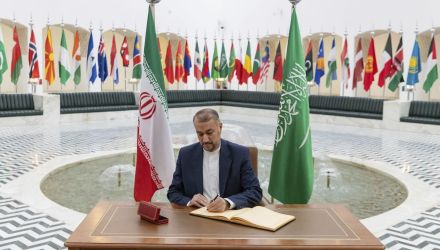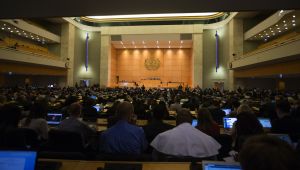What is the gravest threat to the lives and liberties of Europeans and Americans today? Europeans and Americans differ profoundly in their answers to this fundamental question. Recent conversations with 100 security experts at NATO in Brussels and in Berlin, London and Athens underscored for me just how profoundly.
The American security community is unanimous. Democrats as well as Republicans agree with the Bush administration that the gravest threat to civilization as we know it is the marriage of terrorism with weapons of mass destruction. The specter is not just 9/11, but a nuclear 9/11.
Europeans disagree. Many express a mixture of skepticism and bemusement with what they imagine is a peculiar Bush fixation. Even as good a friend of America as Czech President Vaclav Klaus summarized his own view of the matter in what he called "a fundamental question: Was 9/11 an isolated act, or typical of phenomena the world will face in the first half of the 21st century?"
Beneath the headlines, deeper trendlines point to the latter. The relentless diffusion of deadly technologies allows progressively smaller groups to wreak increasingly greater destruction. Globalization has enhanced terrorists' ability to travel, communicate, and transport weapons. America's overwhelming dominance on all conventional battlefields drives rational adversaries to asymmetric responses like WMD terrorism.
In 1993, an al Qaeda-linked terrorist, Ramzi Yousef, tried to collapse the World Trade Center by exploding a truck filled with fertilizer-based explosives. Had that same truck carried an elementary nuclear weapon, the blast would have vaporized not just the World Trade Center, but also the entire New York financial district. Two miles from ground zero, only the shells of buildings would remain.
Imagine an equivalent explosion in Paris at the Eiffel Tower -- a terrorist target, as demonstrated by the 1994 attempt to crash an airliner into it. The result would be absolute devastation out to the Arc de Triomphe, with substantial destruction out to and encompassing the Louvre.
How likely is such an event? No one knows. But if we followed the methodology of Sherlock Holmes in analyzing crime, we would examine "MMO": motive, means and opportunity.
Before 9/11, experts debated motive. Conventional wisdom concluded that terrorists sought not to maximize victims, but rather publicity that could engender sympathy for their cause. Post 9/11, bin Laden's spokesman, Sulaiman Abu Ghaith, announced that al Qaeda had "the right to kill four million Americans, including one million children," in response to casualties perceived to have been inflicted on Muslims.
If motivated, could terrorists acquire the means for a nuclear attack? Because of the vastness of its arsenal and stockpile of highly enriched uranium and plutonium, Russia remains the most probable source of a nuclear weapon or material from which one could be made. Despite a decade of significant improvement, many of these weapons remain vulnerable to theft by a serious organized effort. Pakistan is next on the list, given close historical links between elements in its security services and al Qaeda. Next comes North Korea, the world's most promiscuous proliferator.
Were al Qaeda terrorists to acquire a nuclear device, could they successfully seize an opportunity to bring it to Paris, London, Berlin or Rome? As a colleague of mine has noted, they could always wrap it in a bale of marijuana. Reviewing this evidence, the world's most successful investor, Warren Buffett, has concluded: "It will happen. It's inevitable."
September 11 awakened Americans to existential vulnerability. The Bush administration has led the American security community to one profound conclusion: The status quo is fatally flawed. The U.N.-chartered, rule-based international security order that was accepted pre-9/11 leaves America or Europe vulnerable to a series of nuclear 9/11s. Such conditions are incompatible with our survival as free nations whose fundamental institutions and values are intact.
The assault on the World Trade Center shocked Americans into recognizing that the leading nations were essentially standing by and letting this happen. In an Afghan sanctuary, behind the accepted shield of sovereign immunity, al Qaeda trained thousands of terrorists for attacks like 9/11. The West's perceived helplessness emboldened groups like al Qaeda. In Osama bin Laden's apt metaphor, the West had become the "weak horse" that could be defied with impunity.
What President Bush surely has right is the conviction that the U.S. and other civilized nations can no longer allow the presumption of sovereign immunity to permit developments inconsistent with our common survival. In a process of fits and starts the Bush administration is seeking to invent a new "new" world order. Confronting both Iran and North Korea's aspirations for nuclear arsenals, the administration has been enlisting European Union support to just say no.
What the Bush administration has not yet fashioned is a coherent strategy for combating WMD terrorism. Such a strategy will have to be multi-layered, from detection at borders to denial of weapons and materials; all-azimuth, from space to container cargo on ships; and root-and-branch, addressing motivations as well as means.
For Europeans committed to partnership with the United States, this unprecedented threat presents a grand opportunity. Europeans should not simply enlist in the American-led campaign. Rather, they should marshal their own intelligence and strategic sense to design and create an international order in which such catastrophic threats can be prevented.
Allison, Graham. “Nuclear Terrorism Poses the Gravest Threat Today.” Wall Street Journal Europe, July 14, 2003




